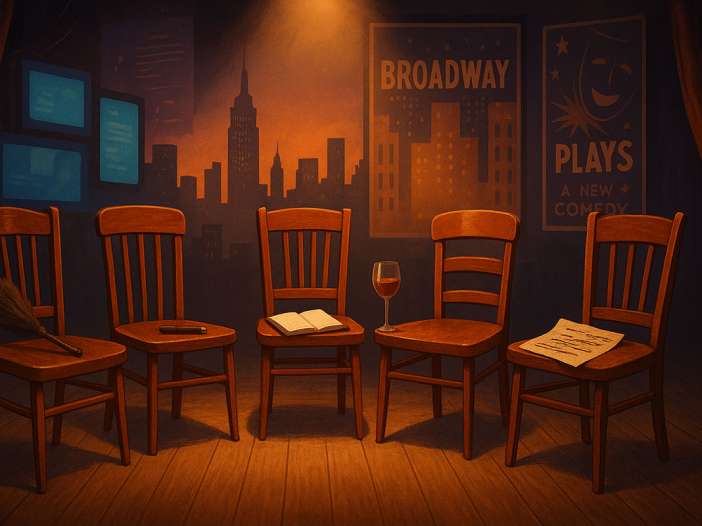
|
Getting your Trinity Audio player ready...
|
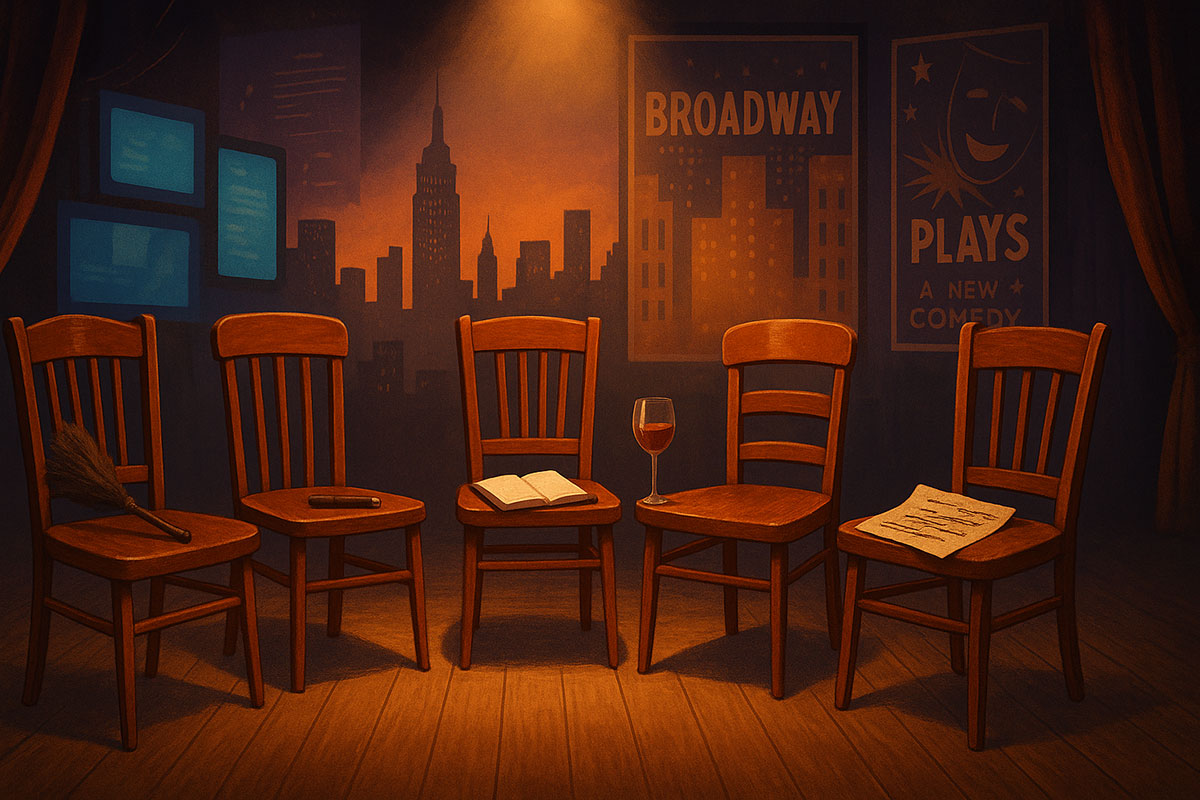
Neil Simon:
“If you had told me years ago that one day my characters would be sitting around talking about therapy apps, ghosting, and whether artificial intelligence could write better jokes than me — I’d have assumed you were drunk. Or worse, a critic.
But here we are. The world spins faster, people talk louder but listen less, and somewhere between the memes and the mindfulness retreats, we forgot how to just be human together.
So I thought: why not get the old gang together? Felix, Oscar, Eugene, Paula, Max — people who never fit neatly into boxes, who tripped through life but did it honestly. If anyone can talk some sense into 2025, it’s them. Or at least make it funny enough to bear.”
(Note: This is an imaginary conversation, a creative exploration of an idea, and not a real speech or event.)

Topic 1: Loneliness in the Age of Constant Connection

Setting: A cozy but slightly outdated Manhattan apartment (Oscar’s), retrofitted with modern gadgets — smart speakers, digital picture frames, and mismatched furniture. Rain taps the windows as the five characters gather over takeout and wine. A digital assistant occasionally interrupts.
Format: 5 characters × 3 deep questions from an implied narrator (Neil Simon’s voice in the background), randomized speaking order per question.
Opening Monologue (Narrator – Neil Simon’s Voice):
“You’d think with FaceTime, texting, and twenty dating apps, loneliness would be extinct. But here we are — lonelier than ever, surrounded by people we’ll never meet. So what happens when the classic characters who used to knock on each other’s doors now only get notifications? Let’s see what Felix, Oscar, Eugene, Max, and Paula have to say about it.”
 "Why do so many people feel alone even when they’re always 'connected'?"
"Why do so many people feel alone even when they’re always 'connected'?"
Max Prince:
Because talking isn’t the same as connecting. You know what happens when you text your mother a heart emoji instead of calling her? She dies thinking you’ve joined a cult. There’s no timing in a text. No pause, no punchline. Just... pixels pretending to feel.
Eugene Jerome:
I think we’ve replaced intimacy with efficiency. Everything’s instant — friendships, dates, even grief. I messaged a girl who broke up with me through a meme. A meme, Oscar! And I still saved it.
Paula McFadden:
Connection needs presence, not proximity. You can’t swipe your way to being seen. I used to feel more connected dancing in a rehearsal room than I ever did scrolling. Maybe we need to feel each other breathing again.
Oscar Madison:
Everybody’s talking, but nobody’s there. I had lunch with a buddy — he kept checking his phone, so I texted him across the table: “You wanna hang out later when I’m not around?”
Felix Ungar:
It's because people are messy — emotionally, spiritually, and in the hallway. And tech lets you avoid that. You can curate your life like it’s a museum exhibit. But no one hugs you in a museum.
 "Has loneliness changed — or are we just noticing it more?"
"Has loneliness changed — or are we just noticing it more?"
Paula McFadden:
It’s different now. Loneliness used to be quiet. Now it’s noisy. Constant buzz, pings, likes — but your soul still feels invisible. Maybe we always felt alone, but now there’s no space to process it.
Oscar Madison:
We used to sit on stoops and complain. Now people tweet into the void and call it vulnerability. Same emptiness, different platform.
Felix Ungar:
No, no, it’s gotten worse. In my day, if you wanted to ignore someone, you had to physically walk away. That took commitment. Now? One block button and you disappear. It’s ghosting without even wearing a sheet!
Eugene Jerome:
I think loneliness hasn’t changed — but our expectations have. We expect constant validation now. If a post only gets two likes, we feel unloved. Our self-worth is tied to engagement metrics.
Max Prince:
Here’s the difference: We used to write letters, wait days for replies — and the waiting was romantic. Now we panic if someone doesn't answer in 10 minutes. Loneliness is the space between who we were and the algorithm we’ve become.
 "What’s one real thing you still do to fight loneliness?"
"What’s one real thing you still do to fight loneliness?"
Felix Ungar:
I cook. Elaborate meals, table settings, everything. Even if it’s just me. Ritual matters. It’s a conversation with yourself that smells like rosemary.
Oscar Madison:
Poker night. In-person. With real people. No screens, just cigars, beer, and yelling. Especially the yelling — that’s love with volume.
Eugene Jerome:
I write in a paper journal. Not online. Not for likes. Just for me. It's how I remember I still exist, even if no one texts back.
Paula McFadden:
I sit with someone in silence. Not out of awkwardness, but comfort. If you can be quiet with someone, you’re not alone.
Max Prince:
I make someone laugh. Doesn’t matter who. Doesn’t even matter if it’s inappropriate. If they laugh — I’m not alone. I’m alive.
Closing Narration (Neil Simon):
“In a world wired tighter than ever, it’s the unspoken things — a real laugh, a shared silence, a badly folded napkin — that make us feel less alone. These five misfits remind us that even in 2025, real connection isn’t in your Wi-Fi. It’s in your willingness to be human.”
Topic 2: The Rise of Therapy Culture and Self-Diagnosis
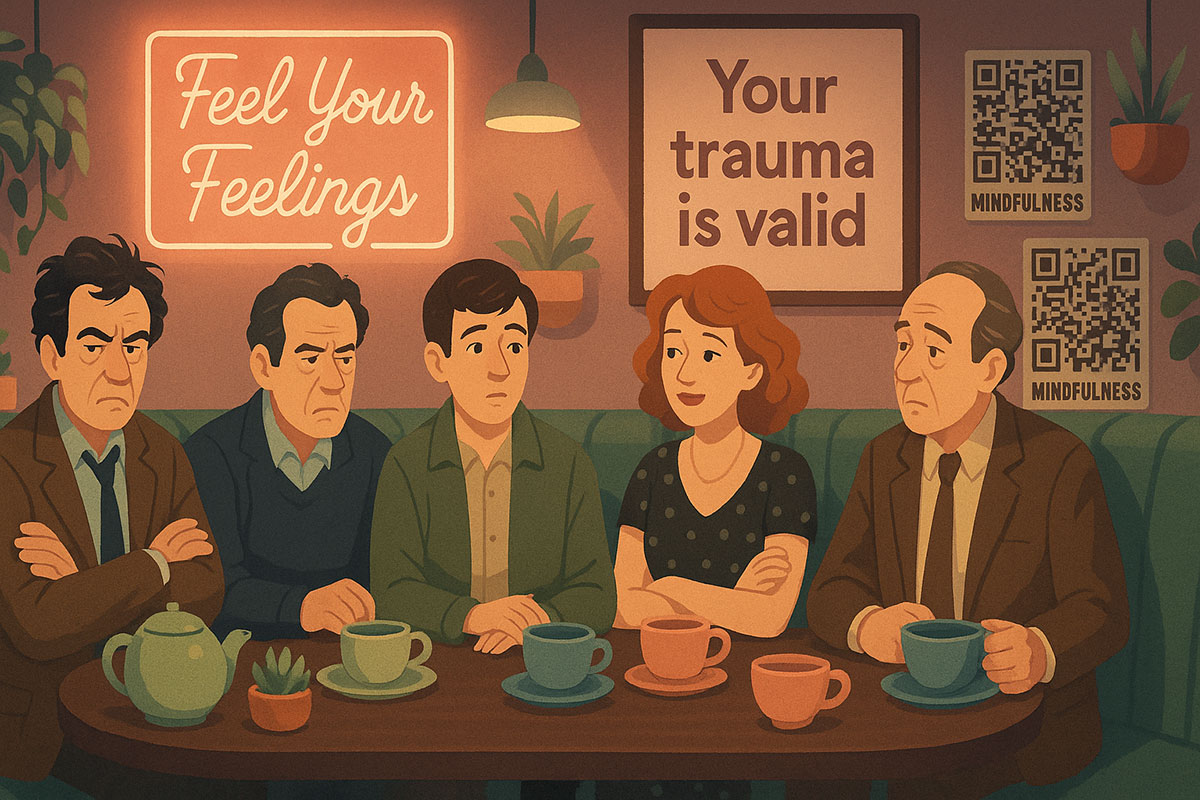
Setting: A modern Manhattan café named "Mind Full / Mindful", filled with succulents, mood lighting, and a QR code for breathwork exercises at every table. Our five characters are gathered in a velvet booth, sipping herbal tea. A barista offers them affirmations with every latte (“You are safe. You are seen. You are validated.”).
Format: 5 characters × 3 questions, randomized order per question.
Opening Monologue (Neil Simon voice):
“In my day, therapy was something you whispered about in a phone booth. Now? People put their diagnosis in their dating profile. Everyone’s got a trauma narrative and a coping mechanism. But are we healing — or just branding our pain? Let’s see what our friends think.”
 “Is this rise in therapy and self-awareness making us healthier—or more self-absorbed?”
“Is this rise in therapy and self-awareness making us healthier—or more self-absorbed?”
Oscar Madison:
Self-aware? You mean self-obsessed. I stubbed my toe and some kid told me to 'process my triggers.' No, I just need new slippers. We’ve made everything into a syndrome — even bad luck.
Felix Ungar:
I love the rise in therapy. I see my therapist twice a week. She says I’m making progress—though she now charges double and wears noise-canceling headphones during our sessions.
Paula McFadden:
I think awareness is a beautiful thing. Naming pain is the first step to healing it. But if all we do is name it, frame it, and post about it — that’s performance, not progress.
Eugene Jerome:
It’s a double-edged sword. On one hand, it’s freeing to not feel broken for feeling broken. But sometimes I wonder — are we labeling ourselves so we don’t have to change?
Max Prince:
Therapy’s great until it becomes therapy theatre. Everyone quoting their inner child and shadow work like it’s Shakespeare. The only diagnosis I need? Laughter deficit disorder. And I’m patient zero.
 “Why do people feel the need to publicly share their trauma now?”
“Why do people feel the need to publicly share their trauma now?”
Felix Ungar:
Because it gets likes! If I posted about my obsession with lemon-scented disinfectant, I’d get zero engagement. But say “childhood wound,” and boom — instant sympathy and a lavender-scented candle ad.
Max Prince:
Because pain has become currency. Post the right kind of hurt, and you gain followers. Notoriety used to come from doing something great. Now it comes from surviving something awful — loudly.
Paula McFadden:
Sometimes people just want to be seen. Maybe they weren’t heard in real life, so they turn to strangers online. But there’s a difference between vulnerability and exhibition.
Oscar Madison:
I don’t need to know what your ex did to you in 2012. Talk to a friend. Talk to a priest. Talk to your dog. Just don’t turn your trauma into a TikTok musical.
Eugene Jerome:
I shared my feelings once online. Got two likes and one comment that said, “same.” It helped, strangely. I think people want to feel less weird — even for a minute.
 “What does real healing look like to you — not trendy, but truly transformative?”
“What does real healing look like to you — not trendy, but truly transformative?”
Paula McFadden:
Forgiveness. Quiet, unposted, un-glamorous forgiveness. Of yourself, mostly. And maybe your mother.
Oscar Madison:
Real healing? It’s when you stop blaming your childhood and just go apologize to your friend for being a jerk. With pizza.
Eugene Jerome:
It’s when the pain doesn’t narrate your every thought anymore. When you stop needing the wound to be your introduction.
Felix Ungar:
Real healing is finding peace in your rituals. Like organizing your sock drawer by emotional season — “winter despair,” “spring optimism,” “autumn ennui…”
Max Prince:
When you can laugh at the thing that almost destroyed you — and write a punchline about it. That’s when you know you’ve made it out alive.
Closing Narration (Neil Simon):
“In 2025, everyone’s in therapy. But the question isn’t whether you’ve healed — it’s whether you’ve grown. These characters know: the best breakthroughs don’t come in 280 characters. They come in silence, in forgiveness, in laughter — and in maybe cleaning your apartment.”
Topic 3: Dating, Ghosting, and the Disappearance of Romance
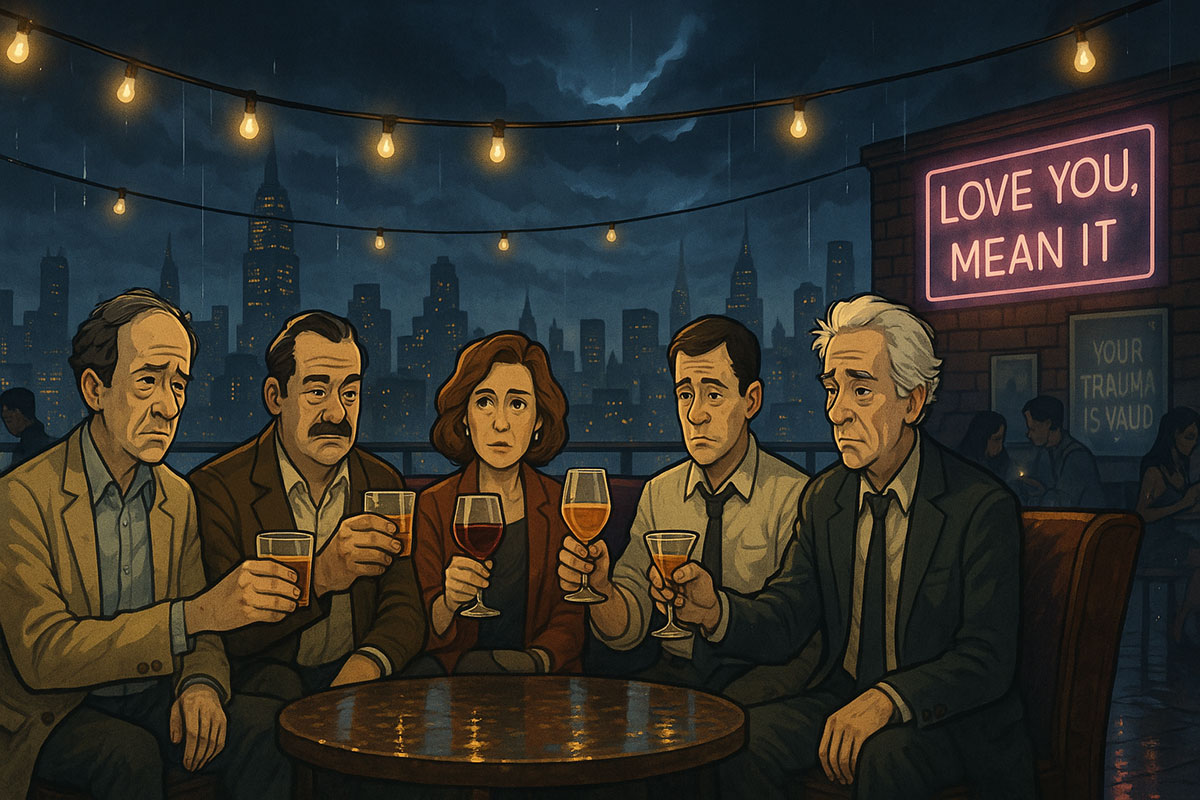
Setting: An upscale rooftop bar overlooking Manhattan. String lights, jazz playing, couples posing for selfies. Each character holds a different drink — Felix with cucumber water, Oscar with whiskey, Eugene with a mocktail, Paula with wine, Max with a martini. A neon sign nearby reads: “Love You, Mean It.”
Format: 5 characters × 3 questions, randomized order per question.
Opening Monologue (Neil Simon voice):
“Once upon a time, romance meant awkward phone calls, long walks, and sweating through your best shirt. Now? It’s swipes, ghosting, and DMs that start with ‘wyd?’ Is love dead—or just lagging? Let’s find out what five romantically misaligned souls have to say.”
 “Has romance disappeared — or just evolved into something we don’t recognize?”
“Has romance disappeared — or just evolved into something we don’t recognize?”
Felix Ungar:
Romance used to be sending roses, lighting candles, and expressing devotion via monogrammed stationery. Now it’s emojis and split dinner bills. I once brought a woman a handwritten sonnet — she blocked me for being ‘intense.’
Oscar Madison:
It hasn’t disappeared. It’s just hiding under all the nonsense. You gotta dig through the Tinder trash to find it, but it’s there. Somewhere. Probably behind a bad pun and a shirtless bathroom selfie.
Eugene Jerome:
It’s evolved, but not always upward. People say “we’re just vibing” instead of “I like you.” There’s no language for longing anymore — just moods and memes.
Paula McFadden:
Romance isn’t gone. It’s just quieter. These days, it’s someone bringing you soup when you’re sick or remembering your cat’s name. Love is surviving modern chaos together without becoming strangers.
Max Prince:
Romance got outsourced to the algorithm. Swipe left, swipe right, rinse, repeat. It’s speed dating without speed — or dates. You want real romance? Try showing up. That’s a plot twist.
 “Why do people ghost each other so easily now?”
“Why do people ghost each other so easily now?”
Oscar Madison:
Because it’s easy. When I wanted to disappear in the ‘70s, I had to move apartments. Now? Just delete, unmatch, vanish. It’s cowardice with a Wi-Fi signal.
Eugene Jerome:
Because rejection is terrifying — on both sides. Ghosting is the illusion of safety. You don’t get hurt if you don’t explain. You don’t get blamed if you don’t say goodbye.
Paula McFadden:
Because people confuse closure with confrontation. And we’ve made emotional honesty optional. Ghosting isn’t just rude — it’s erasure. It says, “You didn’t matter enough to finish the sentence.”
Felix Ungar:
I was ghosted once — or possibly she was kidnapped. I left 14 voicemails, sent her a fruit basket, and filed a wellness check. Turned out she just didn’t like me.
Max Prince:
Because commitment is scary, and people would rather disappear than risk feeling dumb. Ghosting is modern ghostwriting — except the story ends mid-scene.
 “What would bring back true romance in today’s world?”
“What would bring back true romance in today’s world?”
Paula McFadden:
Slowing down. Looking into someone’s eyes instead of their profile. Risking being known. Romance isn’t magic — it’s attention, sustained.
Felix Ungar:
Etiquette! A return to handwritten notes, scheduled dinners, and clear intentions. If romance is a dance, everyone’s currently just flailing to techno.
Oscar Madison:
Lower your expectations. Real people snore, forget birthdays, and spill spaghetti. But they stay. That’s romance — showing up with all your mess.
Max Prince:
You bring back romance by turning off your phone. And maybe getting a little nervous again. If love doesn’t scare you a bit, it’s just friendship with footnotes.
Eugene Jerome:
Maybe we stop pretending not to care. Vulnerability’s not cool — but it’s true. Bring back saying, “I miss you,” even if your voice cracks.
Closing Narration (Neil Simon):
“Love in 2025 is fast, confusing, and often delivered through a screen. But these five remind us — romance was never about perfection. It was about effort. The awkward call. The brave confession. The door held open not because you had to — but because you wanted to see if they’d turn around.”
Topic 4: Art vs. Algorithms — Has Creativity Been Outsourced?
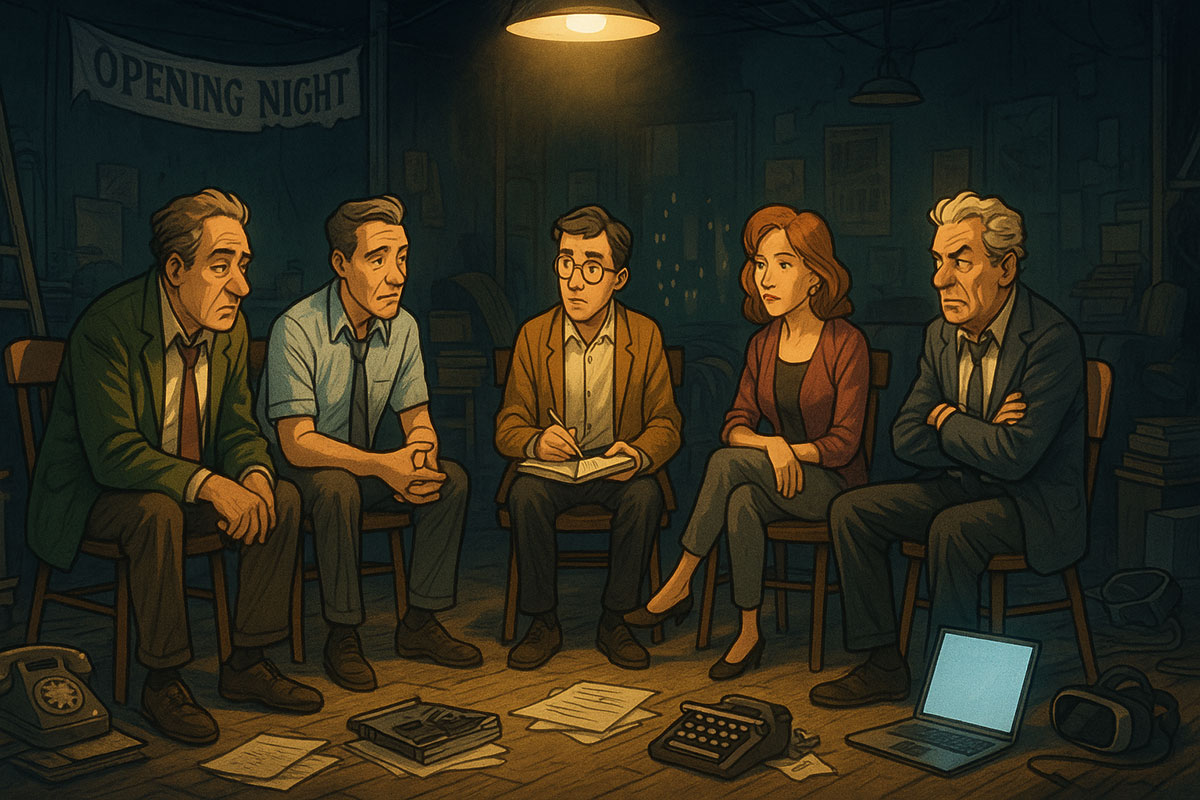
Setting: A quirky off-Broadway rehearsal space with old posters on the walls, half-open scripts on chairs, and a glowing VR headset abandoned on a stool. The group sits in a circle on mismatched chairs, surrounded by blinking tablets and the ghost of analog art.
Format: 5 characters × 3 deep questions, randomized speaker order per question.
Opening Monologue (Neil Simon voice):
“Once, a blank page meant infinite possibility. Now, it’s a prompt fed to a bot that spits out a plot about vampire influencers in 0.8 seconds. Has the artist become optional? Or is there still room for messy, glorious human creation?”
 “Can technology create real art — or just good enough copies?”
“Can technology create real art — or just good enough copies?”
Max Prince:
You can’t teach a machine heartbreak. It can mimic rhythm, mimic style, even mimic me — but it can’t write the joke that comes from a father who never said he loved you. It can’t bleed.
Eugene Jerome:
AI’s impressive… but sterile. It’s like reading an obituary written by a thesaurus. You get the shape of feeling, but not the soul.
Felix Ungar:
I once tried one of those AI poetry generators. It rhymed “love” with “dove” six times. I wept — but not for beauty. For civilization.
Paula McFadden:
Art isn’t just what’s made — it’s who made it. What it cost them. A painting isn't just paint — it’s grief, joy, memory. Can code carry memory?
Oscar Madison:
If AI ever writes a play where two exes argue over Chinese food, and I laugh and cry, I’ll eat my own typewriter. Until then? Keep your bots out of my theater.
 “Why are audiences drawn to formula and repetition — and what does that say about us?”
“Why are audiences drawn to formula and repetition — and what does that say about us?”
Felix Ungar:
Because formulas are safe! You know what you’re getting. No surprises, no heartbreak, no misplaced semicolons. Comfort storytelling. Like macaroni and cheese for the brain.
Oscar Madison:
People don’t want art — they want validation. “Make me feel something, but not too much. Show me new things, but make sure they’re exactly like the old things I liked.” Lazy!
Paula McFadden:
Sometimes repetition isn’t laziness — it’s longing. People repeat love stories because they’re trying to rewrite their own. Even flawed stories can soothe if they end in hope.
Eugene Jerome:
We’re overstimulated. When everything’s new, it’s exhausting. Repetition is familiar — like walking the same block to clear your head. But art can be a mirror or a maze. We need both.
Max Prince:
Audiences don’t crave stories — they crave meaning. And when the world makes less sense, people grab whatever narrative doesn’t hurt. Even if it’s paint-by-numbers with a laugh track.
 “What will keep art alive in the next generation?”
“What will keep art alive in the next generation?”
Paula McFadden:
Truth. That’s it. Stories that hurt a little because they remind us we’re alive. As long as someone’s willing to speak their real truth, art survives.
Max Prince:
Rebellion. Every generation gets bored of perfect. Art will survive when some kid throws their tablet at a wall and writes a poem on the back of a pizza box.
Oscar Madison:
Guts. It’s easy to post. It’s hard to say something that might get you laughed at — or worse, ignored. The next artist is out there — probably terrified and broke.
Eugene Jerome:
Curiosity. If young people stay curious about their own feelings, and their grandparents’ stories, and what silence sounds like — we’re going to be okay.
Felix Ungar:
Funding. Art dies when it can’t pay rent. Bring back grants. Bring back patrons. Bring back moderately affordable pencils!
Closing Narration (Neil Simon):
“The machines may learn syntax, but they’ll never learn soul. Art lives wherever someone says, ‘I felt this — did you?’ Whether it’s in a dusty theater, a subway sketchbook, or a voice trembling in front of strangers — as long as we dare to feel, the curtain stays up.”
Topic 5: What’s Still Worth Fighting for in a Complicated World?
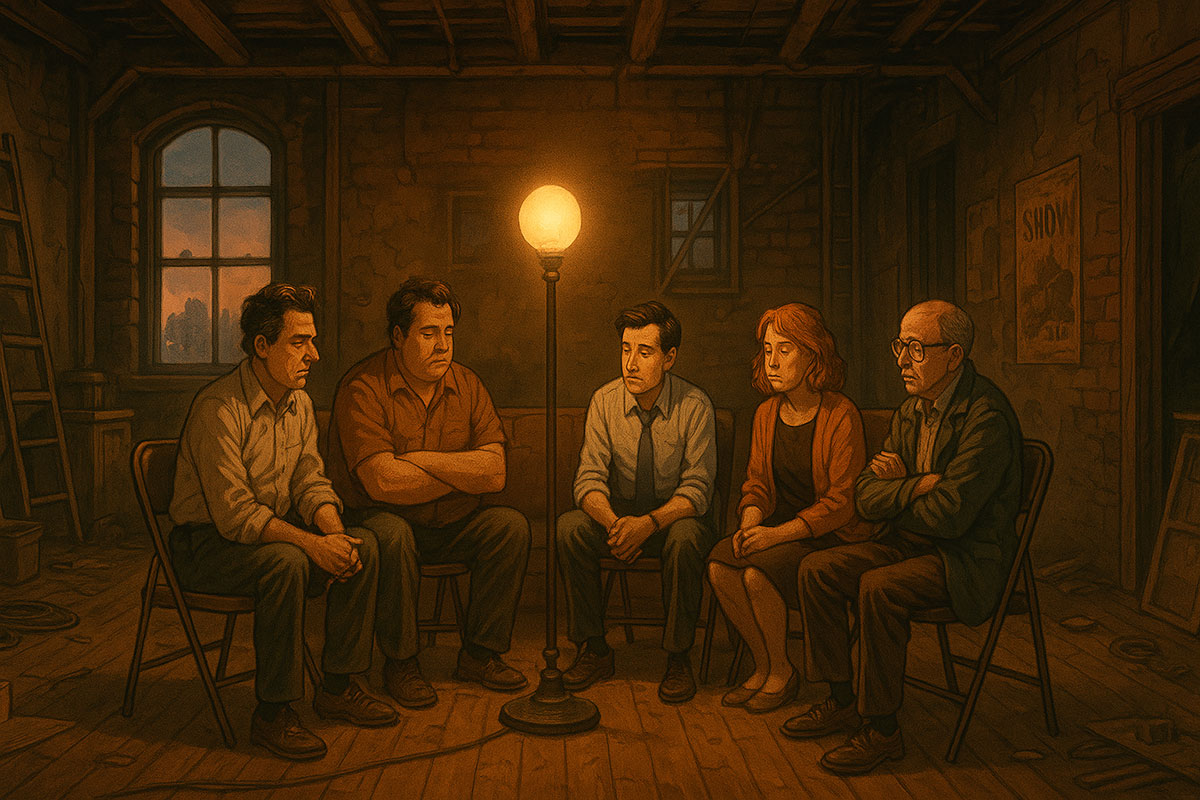
Setting: A small neighborhood theater closed for renovations. The stage is bare, but a single work light shines on center stage. The five sit on folding chairs arranged in a circle, surrounded by old props, dusty scripts, and echoes of scenes long past. Outside, the world changes fast — but here, time slows.
Format: 5 characters × 3 questions, randomized response order per question.
Opening Monologue (Neil Simon voice):
“The world’s moving fast. Too fast. Politics, AI, pandemics, cancel buttons — it’s easy to feel like nothing’s solid anymore. But even in chaos, something inside us refuses to give up. So let’s ask: What’s still worth the fight?”
 “What values or principles still matter most — no matter how much the world changes?”
“What values or principles still matter most — no matter how much the world changes?”
Oscar Madison:
Loyalty. Not loyalty to politics, or brands, or your fantasy football league — but to people. Stick with your friends, even when they screw up. Especially then.
Paula McFadden:
Compassion. It’s not trending, it doesn’t go viral, but it changes everything. A kind word at the right time can save a life. I’ve seen it.
Eugene Jerome:
Truth. Even if it’s uncomfortable. Especially if it’s uncomfortable. The world may spin faster, but truth is the only thing that doesn't get dizzy.
Felix Ungar:
Decency. Hold the door. Say “thank you.” Clean the communal microwave. We’ve outsourced morality to apps — but basic manners still matter.
Max Prince:
Freedom of thought. The right to say something unpopular — and to bomb on stage without being erased. If we lose that, we lose the right to grow.
 “When things feel overwhelming or pointless, what personally keeps you going?”
“When things feel overwhelming or pointless, what personally keeps you going?”
Felix Ungar:
Routine. The sacred comfort of folded linens and alphabetized spices. It may sound silly, but order is how I fight despair.
Oscar Madison:
Laughter. If I can still crack a joke — even a bad one — I know I’m not dead inside. That, and chili. Spicy chili fixes more than you’d think.
Paula McFadden:
My daughter. Even on days I feel invisible, she reminds me I’m seen. Love — the kind you show up for — is what keeps me from checking out.
Max Prince:
Art. Even when the audience sleeps, or the funding dries up, or the critics drool — I write. Not for them. For me. Because I have to.
Eugene Jerome:
Hope. Stupid, stubborn hope. That the next draft, the next date, the next day might surprise me. That’s enough to keep going.
 “What would you tell a young person who’s feeling lost in today’s world?”
“What would you tell a young person who’s feeling lost in today’s world?”
Max Prince:
Get lost on purpose. Get out of the algorithm, off the grid. Confuse yourself. That’s where real life starts — outside your comfort feed.
Felix Ungar:
Don’t underestimate small joys. A clean sink. A well-cooked egg. A quiet evening with no one yelling. That’s sanity. Chase sanity.
Eugene Jerome:
You’re not supposed to have it figured out. No one does. Not even the ones who write books about it. Lost doesn’t mean broken — it means beginning.
Oscar Madison:
Take care of your people. Your friends, your neighbor, your weird cousin. That’s your real net worth. Oh — and keep spare cash in your sock drawer.
Paula McFadden:
You matter more than your profile. More than your mistakes. And more than the voice in your head that says you’re behind. You’re not behind. You’re blooming.
Closing Narration (Neil Simon):
“In a noisy, fractured, pixelated world — we still need the things that don’t change. Laughter. Loyalty. A hand on your shoulder. A story well told. These five may not agree on much, but they all know: you fight for what makes life livable. And sometimes, that’s as simple as staying.”
Final Thoughts by Neil Simon
“In the end, it’s not the swipe lefts, the algorithms, or the self-diagnosed astrology disorders that define us. It’s the way we hold each other — sometimes gently, sometimes by the shoulders while shouting, but always trying.
My characters weren’t perfect. They were messy, neurotic, hopeful, romantic, cynical — human. Just like us. And that’s the point.
We laugh because it hurts. We laugh because we care. And when we stop laughing, well… that’s when the lights go down.
So keep the lights on. Set the table. Say what you mean. Miss someone enough to call them. And if all else fails, find a friend to argue with — it might just save your life.”
Short Bios:
Neil Simon
One of America’s most celebrated playwrights, Neil Simon (1927–2018) brought everyday struggles to the stage with unmatched wit, warmth, and humanity. With over 30 plays and numerous screen adaptations, including The Odd Couple, Barefoot in the Park, and Brighton Beach Memoirs, Simon was a master of turning neurotic chaos into comedy gold. His work gave voice to the anxious, the hopeful, and the broken — proving that laughter is one of the deepest forms of connection.
Felix Ungar
A neurotic, fastidious photographer and compulsive cleaner best known from The Odd Couple. Divorced and deeply sensitive, Felix masks his loneliness with obsession over cleanliness and order, making him both hilarious and heartbreakingly human.
Oscar Madison
A sloppy, carefree sportswriter and Felix’s unlikely roommate in The Odd Couple. Oscar hides his pain behind sarcasm, beer, and a perpetual state of dishevelment, but beneath the gruff exterior lies a loyal friend with a soft spot for lost souls.
Eugene Jerome
Neil Simon’s semi-autobiographical voice in Brighton Beach Memoirs, Biloxi Blues, and Broadway Bound. Eugene is a witty, observant young writer coming of age in a working-class Jewish family, capturing the awkward beauty of adolescence and artistic ambition.
Paula McFadden
A single mother and former dancer from The Goodbye Girl. Independent, guarded, and vulnerable, Paula navigates love and parenting with resilience and biting humor, representing the emotional maturity and complexity of Simon’s strongest female characters.
Max Prince
A tormented comedic genius based on Sid Caesar in Laughter on the 23rd Floor. Max leads a TV sketch show during the Red Scare era, battling network censors and personal demons with fierce intelligence and an unpredictable temper — the tragic artist beneath the laugh track.

Leave a Reply